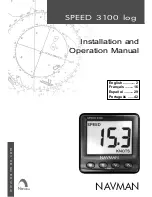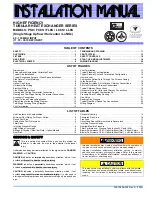
DSP
LASER
DSPLSR01EN
17
The inhibition function must be realized by the command circuit of the machine with a safety
level equivalent to that of the DSP LASER device, as prescribed by EN 12622:2014. At the
end of each working cycle, the stop function generated by DSP LASER must immediately
return active before the user can command the high-speed closing.
The inhibition must be signalled by the lighting of a yellow lamp, on machine board, visible
by the operator.
10.1.3. Operating modes
DSP LASER is provided with a control circuit able to set the following operating modes:
Detection area fully active:
Mode to use generally for all the processing types, because characterized by lowest
residual risks.
Blanking of the front area and exclusion of the rear area:
Mode which can be used for the bending of boxes with special shape or pieces with
very little size which cannot be worked without intercepting part of the detection area.
Exclusion of the rear area:
The rear protection has been added for special uses of the press-brake as when more
bending stations are installed and the operator could, with a given movement of the
arm, squeezes between station and station and put the fingers under the bending
area accessing from the rear side of this. This particular and extreme possibility, not
considered in EN 12622:2014, has been instead evaluated by us and then protected
by means of DSP LASER. This function can be then excluded when the protected
machine does not need it (for example, it is provided with a single pair of tools, one
upper and one lower, for all the length of the machine) or when the backgauges are
close to the bending line and, intercepting the detection area, do not allow the bend.
For this purpose, the command circuit of the press-brake must be provided with a
three-stable-positions key selector, which can be extracted only in position 1.
Residual risk
:
The three modes present different residual risks. The key must then
be kept only by the person responsible of the workshop, who must
evaluate the presence of all the requirements necessary to the
correct use of the protection system (operator trained and informed
about the residual risks, the tools and DSP LASER installed
correctly, etc.). Before going away from the press-brake, the
operator must however set the selector to mode 1 and deliver the
key to the person responsible of the department.
The selection of the operating mode 2 allows enabling the function of blanking to the front
area and the exclusion of the rear area. The mode 3 allows the exclusion only of the rear
zone. The real activation of the blanking function takes place following the indications
reported later.
When the operating modes 2 or 3 are selected, the yellow LED, present in the front part of
RX, will be always active and blinking. In this way, the operator will be always noticed by the
device which is working in a mode different from 1.
Summary of Contents for DSP LASER
Page 2: ......
Page 4: ......
Page 48: ...DSP LASER 44 DSPLSR01EN CONNECTION SCHEMES Fig 13 6 scheme of connection with AL1B...
Page 49: ...DSP LASER DSPLSR01EN 45 Fig 13 7 scheme of connection with AL2B...
Page 50: ...DSP LASER 46 DSPLSR01EN Fig 13 8 scheme of connection with ALdc...
Page 51: ...DSP LASER DSPLSR01EN 47 Fig 13 9 scheme of connection without AL module...
















































